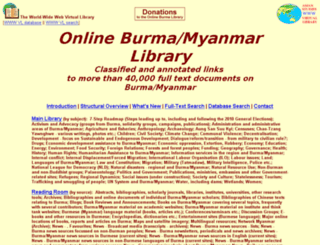Focal point
Location
The Online Burma/Myanmar Library (OBL) is a non-profit online research library mainly in English and Burmese serving academics, activists, diplomats, NGOs, CSOs, CBOs and other Burmese and international actors. It is also, of course, open to the general public. Though we provide lists of Burma/Myanmar news sources, the Library’s main content is not news but in-depth articles, reports, laws, videos and links to other websites, We provide a search engine (database and full text) and an alphabetical list of categories and sub-categories, but the Library is best accessed through browsing the 100 or so categories which lead to sub- and sub-sub categories. These tools should be used in combination.
Members:
Resources
Displaying 801 - 805 of 1151"I Will Not be Forced From My Own Land" - internal displacement in Burma
In a nation of 50 million people there are estimates that up to 1 million are Internally Displaced Persons (IDP). Despite the relatively recent use of the phrase internally displaced people in the context of Burma, there is evidence that the practices that lead to this displacement have been in place for a long period of time.
"I Will Not be Forced From My Own Land" - internal displacement in Burma
In a nation of 50 million people there are estimates that up to 1 million are Internally Displaced Persons (IDP). Despite the relatively recent use of the phrase internally displaced people in the context of Burma, there is evidence that the practices that lead to this displacement have been in place for a long period of time.
Hardship of displaced families in the rural area
...The population displacement’ is a forgotten problem in Burma. While many people are talking negotiation’ and national reconciliation’, but there is no real solution how to stop the displacement in the country. It is also a serious issue which is necessary to consider.
However, the population displacement always relates to war, and so that it is needed to stop war if we want to stop the population displacement problems
No Land to Farm
...In the last four years, the Burmese army based in Mon State has confiscated thousands acres of farmland. The farmers whose land had been confiscated were not given any compensation. They have no opportunity to take legal actions against the army. As a result, many farmers who lost their lands left to Thailand to seek employment. Those who stayed in villages and towns became landless and jobless..." Land confiscation by the Burmese military - description, analysis and case studies.
RECLAIMING THE RIGHT TO RICE: FOOD SECURITY AND INTERNAL DISPLACEMENT IN EASTERN BURMA
TABLE OF CONTENTS:-
1. Food Security from a Rights-based Perspective;
2. Local Observations from the States and Divisions
of Eastern Burma:-
2.1 Tenasserim Division
(Committee for Internally Displaced Karen Persons);
2.2 Mon State (Mon Relief and Development Committee);
2.3 Karen State (Karen Human Rights Group)
2.4 Eastern Pegu Division (Karen Office of Relief and Development);
2.5 Karenni State (Karenni Social Welfare Committee);
2.6 Shan State (Shan Human Rights Foundation)...


